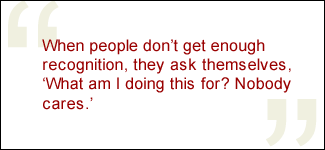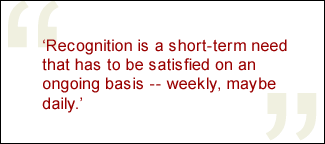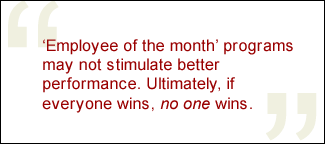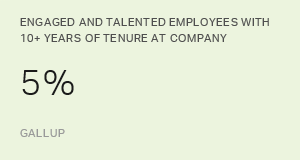In companies around the world, workers are feeling the effects of a highly addictive chemical. When they experience a reduction of this chemical, even routine work is compromised by feelings of frustration, anxiety, and difficulty in learning. Conversely, increases of this chemical stimulate feelings of pleasure and pride. And, this chemical's effects wear off fast. The need for increased doses can cause people to make serious, career-altering decisions just to get another hit. And the only problem is that too few of us have enough.
 |
The chemical is dopamine, a neurotransmitter produced in the brain. Dopamine stimulates the ventral striatum and nucleus accumbens, the parts of the brain that process rewards and create positive emotions like satisfaction and enjoyment. Evolutionary biologists think dopamine had a hand in humans' ability to learn and survive -- if you get a charge of dopamine after a successful hunt, you'll learn to go back for more of the dopamine surge and the prey.
Though modern businesspeople don't track mastodons for lunch, they do have to work hard to accomplish long-term goals bit by bit, and the short-term payoff is still a dopamine hit. That feeling is so important to the human brain that people will go to great lengths to get it, and people who can't produce enough dopamine, such as those with Parkinson's disease, struggle making decisions.
There are several ways to get dopamine flowing. Some are more or less illicit -- alcohol and drugs, for instance, increase dopamine production. Other methods, however, are perfectly appropriate for the workplace, and among them is receiving praise.
Recognition for good work releases dopamine in the brain, which creates feelings of pride and pleasure. Better yet, that dopamine hit cements the knowledge that more of that behavior will create more praise, resulting in another dopamine drench, and so on. This is why positive reinforcement works so well, even among animals.
People who play solitaire at their computers all day are trying to get the dopamine hit that comes from positive reinforcement -- winning is winning, and the brain feels the same whether the reinforcement comes from the boss or a freebie software program.
Praise be
The drive for dopamine is biologically preordained, and humans' attempt to get it is inevitable. That makes the human dopamine need incredibly useful for managers. So it's surprising that more of them aren't aware of the positive effects of dopamine -- and aren't doing more to leverage those effects.
Fewer than one in three American workers, according to Gallup research, can strongly agree that they've received any praise from a supervisor in the last seven days, as measured by the Gallup Q12, a 12-item survey designed to measure employee engagement. Variation in response to the Q12 item "In the last seven days, I have received recognition or praise for doing good work" is responsible for a 10% to 20% difference in revenue and productivity. Employees who report that they're not adequately recognized at work are three times more likely to say they'll quit in the next year.
"When people don't get enough recognition, they ask themselves, 'What am I doing this for? Nobody cares,'" says David Grazian, the director of corporate taxation at Granite Construction, Inc., a $2.6 billion civil construction company. "It's not just about money. People want recognition; they want to be noticed and appreciated."
One of the benefits of praise is that it helps create employee engagement. Workers won't be engaged if they feel, as Grazian put it, like nobody cares. A manager who praises is one who's paying attention to the work and the worker. That personalized attention is crucial for the creation of an emotional bond between employees and the organization. And the strength of that bond, in turn, is behind higher productivity, lower turnover, fewer mistakes and accidents, and ultimately, higher profits.
 |
It's important to note that Gallup's Q12 assessment asks if the employee has received praise in the last seven days. That may seem like a short time frame, especially when many businesses struggle to make the time for an annual awards banquet for their stars. But the dopamine bump people get from praise doesn't last very long, and it takes repeated exposure to build the reward/repeat loop. An annual pat on the back doesn't feed emotional engagement.
"Recognition is a short-term need that has to be satisfied on an ongoing basis -- weekly, maybe daily," says Jim Harter, Gallup's chief scientist and coauthor of the forthcoming book 12: The Elements of Great Managing. "We can draw on our big accomplishments, but we reframe each day, every day."
And when expected praise doesn't materialize, dopamine levels drop, which leads employees to avoid thankless tasks. "Food, drugs, even good experiences -- they all give us a surge of dopamine, and so does recognition," says Harter. "We're all addicted to dopamine to some extent. Whether that's good or bad depends on how people manage it."
Furthermore, lack of praise plays into a problematic, but absolutely human, psychological response: the negativity bias. The brain is set up to notice the negative first, says Harter. Negative campaign tactics get more attention than positive ones. People even spot caricatures of negative faces more quickly: Several studies have found that people noticed pictures of "frowny" faces more often than "smiley" faces.
It's another survival technique -- people may live longer if they pay more attention to the threatening mugger rather than to the pretty flowers. But it's also one more obstacle mangers have to work hard to overcome. In the office, the negativity bias means that even neutral can be bad.
Faint praise
So dopamine is a very real human need, yet too few people feel they receive enough praise. Praise builds employee engagement, but workers are quick to see negativity even when none is meant. And praise for a good job doesn't cost money, time, or much effort. So obviously, managers need to start slathering on the acclaim, right? Not so fast. There are more and less effective ways to praise workers, and unearned praise can do more harm to an individual and a workgroup than none at all.
Scheduled recognition ceremonies can be effective, but they don't provide all the recognition employees need. "Formal praise exercises only work so long -- they have a short shelf life," says Grazian, who is one of the top-performing managers in Gallup's global Q12 database. "They're good, and they need to be done, but in my opinion, appreciation and interest have to be exhibited on a regular basis in normal interactions. People need a day-to-day feeling of being appreciated and recognized for what they do."
Grazian has an extra incentive to recognize his people: Tax work isn't glamorous. "People think of us as the guys hunched over our papers in a back room who only come out when there's a problem," says Grazian. He realized that although he appreciated his team's work, it wasn't as noticeable as, say, the sales department's efforts.
So Grazian decided to make the team's work more conspicuous. When one of his workers does something especially praiseworthy, he notifies the CEO. Then Grazian writes up a document specifying the employee's accomplishment and has it signed by Granite Construction's CEO, CFO, and the HR director. He calls his workgroup together, reads the citation, and presents a check to the recipient.
This is only one of Grazian's recognition methods, and it works well in his department. Others may not find it as suitable, however. Some companies never use money as a form of recognition. Simon Cooper, Ritz-Carlton Group's president and COO, for instance, feels that such recognition can easily degrade into a form of bribery. Whatever the case, a good manager knows when, and if, recognizing with money is appropriate, but no supervisor should assume that money is the only form of recognition that employees value.
All hail
In fact, there is no "best" form of praise. Different employees have different preferences. All of them need frequent pats on the back from the boss, and some need no more than that. Others want to be praised publicly, in front of the workgroup or the whole company. Still others crave recognition from the peers they most respect, while some desire nothing more than a quiet word of praise in the privacy of the manager's office. But how can managers determine the right sort of praise for each employee? Harter says the best way to find out is to ask.
 |
"Great managers are extremely effective in figuring out the best form of praise for each person," says Harter. And those managers, according to Harter, aren't worried that extending praise upsets the balance of power. "Some managers worry that they can give employees too much recognition. But the research shows that it's extremely difficult to do that, as long as the recognition is right for the person."
But no matter what form the praise takes, it should only be given when the recognition is warranted. That's why so many "employee of the month" programs may not stimulate better performance. Often, one of two things happens -- the same handful of stars will get their picture on the wall month after month, or well-meaning, egalitarian efforts devolve into a game of "Whose turn is it this month?" If everyone wins, no one wins. This approach breeds resentment and, ultimately, cynicism.
There's another way praise can accidentally cause ill feelings. In a workgroup starved for praise, the first applications of it -- no matter how deserved -- may cause acrimony in the rest of the group. A good way to insert recognition is quietly, one on one, with perhaps a word to higher management. Then start the dopamine drip in the rest of the team.
In addition, teams as a whole should be recognized for sterling performance. According to Grazian, this has a subtle sociological effect. "The individuals in my group should identify with the group -- it builds a bond that makes them feel good about the team," he says. "It's a huge thing to feel connected. And one of the ways of doing that is to get recognition as a group."
Publicly recognizing whole departments for the value they add to the organization increases employee engagement, raises the department's stock in the organization, and provides the surge employees get from recognition. What's more, adds Grazian, "It helps you get more resources when you need them."
Let the dopamine flow
Last June, The New York Times ran an article by author Amy Sutherland. It was a huge hit, at or near the top of the newspaper's "most e-mailed" list for weeks. In the article, the writer discussed how she used animal training techniques -- praise being chief among them -- to steer her husband's behavior.
The writer was condemned in other publications for being patronizing and a little underhanded in dealing with her spouse. But the reason so many people forwarded the article was probably the familiar accuracy of its central point -- positive reinforcement works.
Though the predictable effects of a chemical neurotransmitter on neurological structures such as the ventral striatum and nucleus accumbens may be rather obscure information, we all learned about positive reinforcement as toddlers. It would be a waste to pass up the opportunity to use such an effective, efficient, and inexpensive way to increase employee engagement.


